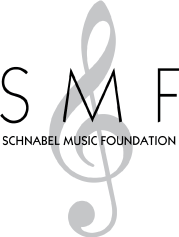The Artists
ARTUR SCHNABEL
A legend among pianists of the twentieth century, Artur Schnabel (1882–1951) is best known for his interpretations and editions of Beethoven’s piano works and for championing the performance of Mozart’s piano sonatas and the then unknown piano works of Schubert. But Schnabel was also an extraordinary composer of modern music. His compositions were, in Ernst Krenek’s words, "of remarkable and unusual significance," and their reputation and influence have grown with time. Born in Lipnik near Bielitz, Austrian Silesia (today Poland), and initially educated in Vienna, Artur Schnabel moved to Berlin in 1900 and made the city his home for thirty-three years. When the Nazis came to power in 1933, he fled together with his family, first to Italy, then to the United States, where he became a naturalized citizen in 1944. He died in Axenstein, Switzerland, in 1951. Light on Shadow is proud to present an essential new vision of Artur Schnabel's life and legacy.
MARKUS PAWLIK / PIANIST AND PRODUCER
Markus Pawlik is best characterized as one of the rare pianists of today who manage to combine sensitivity and expressiveness together with a phenomenal virtuoso technique. Born in Bremen in 1966, his talent was recognized at an early age as he began performing publicly at 7 and was the three-time winner of the German National Young Musician's Competition “Jugend Musiziert.” In 1982, sent as the German representative to the first European Broadcast Union’s televised “Eurovision Young Musician of the Year” competition, Pawlik won the grand prize, which brought him much acclaim and began his international career. He has since pursued his performance career throughout Europe, North America and Asia in cities as diverse as Munich, Prague, Dublin, San Francisco, New York, Tokyo, Bangkok and many others. Pawlik has been featured numerous times on radio and television including the farewell gala of former German president Carl Carstens, and has released numerous solo and chamber music recordings. As well as the standard repertoire, Pawlik also actively supports contemporary music through projects such as the commission of a Piano Concerto by Ichiro Nodeira which he debuted in Berkeley and at Suntory Hall and a recent recording of SNAPSHOTS by composer Peter Knell. In addition to performing, Pawlik gives international master classes, has judged numerous competitions and has taught as a guest lecturer at UCLA.
A Word from the Pianist and Producer
I first heard the name Artur Schnabel in one of my first lessons with Prof. Karl-Heinz Kämmerling. I was 13, and we were working on the opening of the Adagio from Beethoven's Sonata op.2,3 in C-major, when Prof. Kämmerling pulled out the Schnabel-Edition and explained to me Schnabel's unusual but artistic fingerings. Schnabel's Beethoven edition remained a mainstay in my lessons, but it wasn’t until several years later, when I listened to his famed Beethoven recordings, that I fully understood Schnabel's genius. Schnabel's transcendental rendition of Beethoven’s Diabelli Variations particularly influenced me, teaching me to search for the meaning between and beyond the written notes.
Schnabel, the composer and Schnabel, the person, I discovered much more recently. In 2009, while searching to learn more about his Piano Concerto, I met Schnabel's granddaughter Ann Mottier. Through her introduction I met Dr. Werner Grünzweig, the Director of the Music-Archive at the Akademie der Künste in Berlin, who showed me the manuscripts of the "Notturno" for Voice and Piano and the monumental Piano Quintet. This began my fascination with Schnabel's unique compositions and sparked my desire to present them to a wider audience through this concert and film project.
Schnabel was the prototypical Eastern-European Jew who assimilated into the heart of German culture only to be forced into unwanted exile at age 51. As a German musician living in America and married to the daughter of a Hungarian Holocaust survivor, I also feel personally affected by the complexity of his life.
-- Markus Pawlik
MATTHEW MISHORY / DIRECTOR AND WRITER
Filmmaker Matthew Mishory (born 1982, Santa Monica) has been named a "rising talent" by Variety and "a new major figure in U.S. independent cinema" by French magazine Les Inrocks. His feature film debut, Joshua Tree, 1951: A Portrait of James Dean (official selection: Palm Springs, Seattle, Guadalajara, Rio de Janeiro, Transilvania, and Reykjavik International film festivals, among others) was released theatrically in the United States, the UK, and Germany. Artforum pronounced it "a nuanced portrayal of an entire era", and Film International declared that "Matthew Mishory has managed to capture an austere beauty of a kind little known and little understood by all but the likes of Baudelaire." His follow-up feature, the documentary Absent, filmed in Moldova in the former Soviet Union, was released in October 2015. It was designated one of the ten best films of the year by Cine Maldito and "the documentary equivalent of Radu Jude's Aferim!, the winner of this year's Berlinale Silver Bear for Best Director" by Cineuropa. Matthew previously directed the award-winning short film, Delphinium: A Childhood Portrait of Derek Jarman, recently re-released in the UK by the British Film Institute. As a commercial director, Matthew has handled campaigns for major international brands such as Roku, TCL, and Turkish Airlines. The son of a Juilliard-trained violinist, he has always been passionate about music. www.matthewmishory.com
A Word from the Filmmaker
Like most people, I knew Artur Schnabel as a pianist, as one of the great interpreters of Beethoven’s piano repertoire. I owned many of the famous recordings, and I still listen to them. But Schnabel never considered himself primarily a performer, and it was through the passion of my friend and collaborator, the wonderful pianist Markus Pawlik, that I truly came to know Schnabel, as a composer (of radical and modern works), a writer, and a modernist. Displaced by the catastrophe of the two World Wars and the Holocaust, driven from Germany, and reborn in America, Schnabel was inspired by the possibilities of a new kind of music — and a new way of living.
Markus’s passion for Schnabel’s music has shaped and inspired his own very impressive career, culminating in 2016 in a landmark commemorative concert, performed in collaboration with singer Dietrich Henschel and the Szymanowski String Quartet. Fittingly, this performance of Artur Schnabel’s most important work as a composer will be given in Berlin, the city where Schnabel, an assimilated Jew, established his career and reputation before facing exile by the rise of the Nazis. A German musician living in America and married to the daughter of a Hungarian Holocaust survivor, Markus feels personally affected by the complexity of Schnabel’s life. Artur Schnabel: No Place of Exile will chronicle both the concert (featuring not only music but also filmed projections and staged readings of Schnabel’s letters), filmed in its entirety, and the multinational effort to stage it and bring to a wider audience Schnabel’s most important works. The film (and the filmed projections) will also, in subtle and unexpected ways, explore the nuances behind the music of a quintessential modernist: the problem of identity, the disaster of war, the complications of romantic love, and spiritual possibilities of geography and landscape.
-- Matthew Mishory
MICHAEL MARIUS PESSAH / CINEMATOGRAPHER
Award-winning cinematographer Michael Marius Pessah was born and raised in New York City. He is one of the few contemporary cinematographers to have photographed two black-and-white features, including Matthew Mishory's 35mm Joshua Tree, 1951: A Portrait of James Dean. Michael was named an Outfest Five in Focus emerging talent for his cinematography in that film, making him the first cinematographer to receive the recognition. His documentary work includes "Viva la Causa", shortlisted for an Academy Award, and Absent. His museum work includes a series of films in collaboration with renowned artist Jen Denike for the Anat Egbi gallery. He has filmed television series for networks including Sundance, History, and Discovery and campaigns for global brands such as AT&T, Samsonite, Pfizer, Roku, AAG, Red Bull, and Anheuser-Busch. Michael also shot "Wrong Side of Heaven", voted Best Video of 2014 by Loudwire. He was recently interviewed for the retrospective of legendary cinematographer Gordon Willis, "Celebrating the Prince of Darkness." A trained jazz bassist, he can occasionally be heard sitting-in with local combos when not on set.
DIETRICH HENSCHEL / BARITONE
The baritone Dietrich Henschel is a singer whose repertoire extends from the beginning of baroque opera to modern day avant garde. His leading roles in major international opera houses have ranged from operas such as Monteverdi’s Orfeo, Papageno in Mozart’s Magic Flute, Wagner’s Meistersinger of Nurnberg, Berg’s Wozzeck, Krenek’s Karl the V, and many others. In addition to opera, a wide range of acclaimed recordings testifies to Dietrich Henschel’s success as a lied interpreter and an oratorio singer, including his collaboration with great conductors such as Gardiner, Harnoncourt, Herreweghe and Colin Davis. Mr. Henschel has also been exploring the intersection between art music, theatre, and the visual media through a staged version of Schubert’s Schwanengesang, through his 2013 film project IRRSAL, which envisages the ramifications of love, guilt and sacrifice in the symphonic songs by Hugo Wolf and through his most recent project WUNDERHORN, a feature film to be projected during his live performances of all Lieder from Des Knaben Wunderhorn by Gustav Mahler.
SZYMANOWSKI STRING QUARTET
Founded in 1995, the Szymanowski Quartet quickly developed into one of the most remarkable international string quartets of its generation. Its sophisticated performances present a perfect balance between intellect and passion, characteristics with which the Szymanowski Quartet captivates its audiences. The Quartet's high standard has been confirmed by numerous awards and distinctions such as at the Melbourne, Osaka and the Florence International Chamber Music Competitions. The Szymanowski Quartet participated in the BBC’s New Generation Artists scheme, and was honored by the Karol Szymanowski Foundation in Warsaw with the renowned Szymanowski Award, the only time it was ever given to a string quartet. To date, the Quartet has performed at numerous major concert halls such as New York's Carnegie Hall, the Wigmore Hall in London, the Concertgebouw in Amsterdam, the Vienna Musikverein , the Louvre and the Musée d'Orsay in Paris, the Berlin Konzerthaus, the Gewandhaus in Leipzig and the Grünewald Hall in Stockholm. The Quartet tours the USA and Canada every year. In 2008 the Quartet founded the Lviv Chamber Music Festival in a city on the border between Ukraine and Poland whose historic center is a UNESCO World Heritage Site with the aim to actively support cultural exchange.




